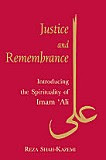
The Importance of Imam Ali for All Muslims
By Dr. Reza Shah Kazemi
By analyzing original sources, the author explores the wisdom of Imam ‘Ali which has been described as an intellectual treasure locked in the Arabic language.
“One of the things I tried to do in this book”, said Dr Shah-Kazemi, “is to make some of the jewels of this treasury of spiritual wisdom accessible to those who cannot read Arabic. And to make that timeless spiritual wisdom speak across the ages in a dialect which is intelligible to contemporary readers.”
In Part One, the author describes the spiritual and ethical dimensions of Imam ‘Ali’s teachings. The second chapter sheds light on the ‘Sacred Conception of Justice’ in his teachings while the third segment focuses on ‘Realisation through Remembrance’. The book also includes two appendices, ‘The First Sermon of Nahj al-balagha’ which contains the Imam’s letters, sermons and sayings, and ‘The Letter of Imam ‘Ali to Malik al-Ashtar’, with a selected bibliography for those who wish to broaden their reading on the subject.
The author expressed the hope “that this book will illustrate the importance of Imam ‘Ali as he is regarded and remembered by all Muslims, and not just Shi‘as, as the most important spiritual figure in Muslim history after the Prophet Muhammad himself.”
Questions addressed in the interview:
1. What motivated you to write a book on Imam ‘Ali?
2. Who is the target audience for this work?
3. This is the first serious study on the intellectuality and spirituality of Imam ‘Ali in a western language. In your opinion, why was this topic never addressed in English before?
4. Could you please elaborate on the relationship between divine and human justice discussed in your book?
5. Could you please tell us about the spiritual teachings of Imam ‘Ali and his influence on Sufism?
6. Imam ‘Ali is an inspirational figure for all Muslims. How do you think your book will be received in the larger Muslim community?
Video of this Interview
Justice and Remembrance; Introducing the Spirituality of Imam ‘Ali
By Reza Shah Kazemi
 This is the first serious book in any western language on the intellectuality and spirituality of Imam ‘Ali, cousin and son-in-law of the Prophet Muhammad, first Imam of all Shi‘is, fourth of the ‘rightly guided’ caliphs, and arguably the single most important figure in Muslim history after the Prophet himself. The publication of this long-awaited book thus fills a major lacuna in the field of Islamic studies, and constitutes a significant landmark in the field of Islamic spirituality.The aim of this book is to present an introduction to the spirituality of Imam ‘Ali through analysis and reflection upon the vast corpus of sayings attributed to him in the Islamic tradition. An attempt is made to evaluate the sayings of the Imam, both as quintessentially Islamic teachings and as universal ones, transcending the boundaries that define different religious traditions. This is done in accordance with the maxim of the Imam: ‘Consider not who said [it], rather, look at what he said.’ The focus of this work is thus upon the spirituality of the Imam such as this is rendered accessible through his teachings.
This is the first serious book in any western language on the intellectuality and spirituality of Imam ‘Ali, cousin and son-in-law of the Prophet Muhammad, first Imam of all Shi‘is, fourth of the ‘rightly guided’ caliphs, and arguably the single most important figure in Muslim history after the Prophet himself. The publication of this long-awaited book thus fills a major lacuna in the field of Islamic studies, and constitutes a significant landmark in the field of Islamic spirituality.The aim of this book is to present an introduction to the spirituality of Imam ‘Ali through analysis and reflection upon the vast corpus of sayings attributed to him in the Islamic tradition. An attempt is made to evaluate the sayings of the Imam, both as quintessentially Islamic teachings and as universal ones, transcending the boundaries that define different religious traditions. This is done in accordance with the maxim of the Imam: ‘Consider not who said [it], rather, look at what he said.’ The focus of this work is thus upon the spirituality of the Imam such as this is rendered accessible through his teachings.The principal sources used in this book are the Nahj al-balagha and the Ghurar al-hikam. The Nahj, by far the most important source of sayings, sermons, and letters of the Imam, was compiled by al-Sharif al-Radi (d. 406/1016), a renowned Shi‘i scholar of ‘Abbasid Baghdad. He compiled the text from all the sources available to him. All of the greatest authorities on Arabic literature are at one as regards the calibre of this text: an unsurpassable elegance dovetails with profundity of meaning to make it a veritable model of Arabic balagha (eloquence) down through the ages to the present day. In the words of possibly the most important of all the commentators of the Nahj al-balagha, Ibn Abi’l-Hadid (d. 655/1257 or 656/1258), the Imam’s utterances were regarded as ‘below the speech of the Creator but above the speech of creatures (duna kalam al-khaliq wa fawqa kalam al-makhluqin)’.
The book begins with a Prologue in which the question of the authenticity of this work is discussed. The main body of the work consists of three chapters. The first, ‘Introducing Imam ‘Ali and his Spiritual Ethos’ was written specially for this publication, the two following chapters are expanded versions of conference papers: ‘A Sacred Conception of Justice in the Letter of Imam ‘Ali to Malik al-Ashtar’, and ‘Realisation through Remembrance: Imam ‘Ali and the Mystical Tradition of Islam’.
Chapter 1, ‘Introducing Imam ‘Ali and his Spiritual Ethos’, begins with a brief overview of the first phase of his life, that is, from his birth (c. 599 CE) to the death of the Prophet (11/632). Then comes an important summary of the way in which the Prophet described Imam ‘Ali in sayings that are well-attested in both Shi‘i and Sunni sources. These sayings constitute the indispensable background against which Imam ‘Ali’s role as ‘gate’ to prophetic wisdom should be viewed.
The second part of this introductory chapter then addresses some key principles of his spiritual ethos, with a particular stress on the role of the intellect in that ethos. One of the key aims here is to show something of the ‘spirit of the intellect’ in the worldview of the Imam, a spirit that at once surpasses and comprisesthe activities of the rational mind, as well as encompassing domains not nowadays associated with the intellect, domains such as moral comportment, aesthetic sensibility and spiritual joy.
Chapter 2, ‘A Sacred Conception of Justice in the Letter of Imam ‘Ali to Malik al-Ashtar’, discusses the principle of justice in relation to the concept and the reality of the sacred. The main argument presented here is that in Imam ‘Ali’s worldview, the ethical orientation towards justice is immeasurably deepened insofar as it is consciously linked to the spiritual precepts of the Islamic faith. The spirit underlying moral rules and ethical values is strengthened, it is argued, by a commitment to transcendent principles, even though- or precisely because-these principles surpass the realm of action within which those rules and precepts operate. Contemplation and action are seen in this perspective as complementary, not contradictory; this complementarity is presented as an aspect of tawhid, of ‘integrating oneness’–one of the ways in which the author prefers to translate this central principle of Islam.
Chapter 3, ‘Realisation through Remembrance: Imam ‘Ali and the Mystical Tradition of Islam’, focuses on the principle and the practice of dhikru’llah, ‘the remembrance/invocation of God’, arguably the most important theme of Islamic spirituality. The Imam’s sayings on this theme are presented in this chapter as commentaries on the Qur’anic notion of dhikru’llah, and as prefigurations of the more elaborate doctrinal expositions on this subject given later in the mystical tradition of Islam, Sufism. The role of Imam ‘Ali in the articulation of Sufism is stressed in this chapter. The tariqas (‘mystical fraternities’) in this tradition are united in the figure of Imam ‘Ali insofar as he stands at the summit of all of the chains of affiliation (salasila, sing. silsila) by which the Sufi masters trace their spiritual descent from the Prophet.
In this chapter attention is also drawn to the Imam’s unifying role as regards the most important subdivision within Islam, that between Sunnism and Shi‘ism. Apart from the vast ground that is shared between the two traditions in regard to essential beliefs and practices, these two branches of Islam are brought together in a particularly direct and existential manner by their common orientation towards sanctity (walaya) and gnosis (ma‘rifa) as the goal of religious life. Given that the ‘remembrance of God’ is so often given as the path leading to the attainment of these goals of Islamic spirituality, the importance of understanding this theme, in terms of both doctrinal exposition and existential ramification, assumes central importance.
Finally two appendices are given: the first is the translation of Sermon number 1 of the Nahj, on which more commentaries have been made than on any other sermon; the second is a complete translation of the letter of Imam ‘Ali to Malik al-Ashtar.
Source: http://www.iis.ac.uk/view_article.asp?ContentID=109037
tawhid
The Oneness of God or belief in Divine Unity, one of the fundamental tenets of Islam.
tariqah; tariqa
silsila
 Biography Dr. Reza Shah Kazemi
Biography Dr. Reza Shah Kazemi
Formerly a Consultant to the Institute for Policy Research in Kuala Lumpur, Malaysia, Reza Shah-Kazemi is now a Research Fellow at the Institute of Ismaili Studies in London. He studied International Relations and Politics at Sussex and Exeter Universities before obtaining his Ph.D. in Comparative Religion from the University of Kent in 1994.
He has authored and translated several works, including Paths of Transcendence: Shankara. He has edited a number of collective volumes, including Algeria: Revolution Revisited (Islamic World Report, 1997) and published over a dozen articles and reviews in academic journals.
Source of bio: http://www.sacredweb.com/
Related Articles
- Universality of the Quranic Message – Reza Shah-Kazemi
- Pluralism and the Qur’an – Reza Shah-Kazemi
- Importance of Imam Ali for All Muslims – Reza Shah Kazemi
- Love for Imam Ali in the Quran and Sunnah
- Beyond Polemics and Pluralism: The Universal Message of the Qur’an — Reza Shah-Kazemi
- Reza Shah-Kazemi – Defining Without Confining
- Ahadith of Prophet Muhammad attributed to Imam Hazrat Ali
- The Prophet of Islam and the Spirit of Tolerance by Reza Shah-Kazemi,
- Recollecting the Spirit of Jihad by Reza Shah-Kazemi
- Sayings of Imam Hazrat Ali
- Dr Reza Shah-Kazemi delivers the 2010 Yawm-e Ali lecture at the Ismaili Centre, London
- Ali is the Lord of those whose Lord I am! – Man Kunto Mowla
- Imam Hazrat Ali | Ismaili Web Amaana
- Imamate in Isma’ilism
- I am the city of knowledge and Ali is its gate – Ana madinatu’l-ilm wa Ali babuha
- His Highness the Aga Khan’s Acceptance Speech – Tutzing Evangelical Academy’s ‘Tolerance’…
- Eid-e Ghadir – Declaration at Gadhir e Khumm, Prophet Muhammad Appoints Imam Ali as His…
- His Highness the Aga Khan’s Speech at the Opening Session of ‘Word of God, Art of Man: The…
- Milad-e Nabi – Prophet Muhammad’s Birthday – Milad-un Nabi Maulid Mevlid
- Nasir Khusraw Collection at Ismaili Web
- Nawruz Persian New Year – Eid Mubarak!